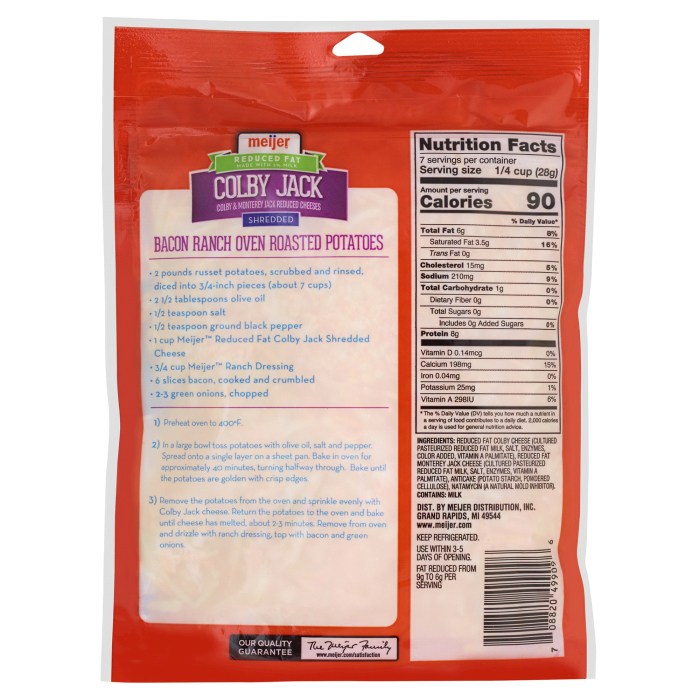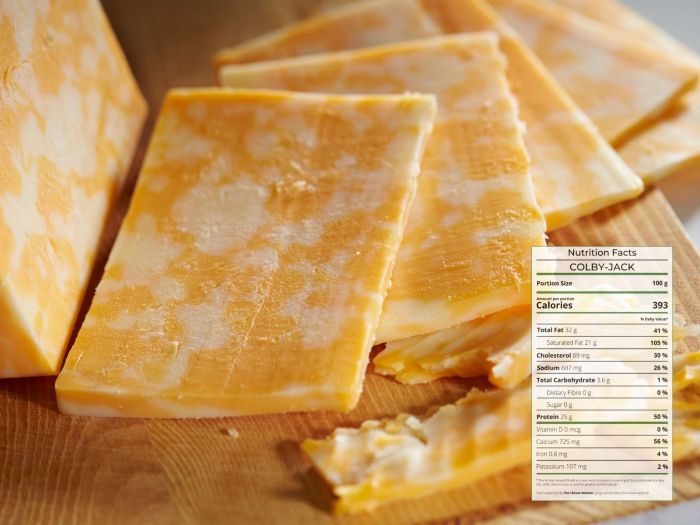Colby Jack Cheese Nutritional Composition

Colby jack cheese nutrition – Yo, Jogja peeps! Let’s get cheesy and dive into the nutritional facts of Colby Jack, that creamy, melty goodness we all love. Understanding its nutritional makeup can help you make informed choices about incorporating it into your diet, whether you’re hitting the gym or just chilling at home.
Macronutrient Breakdown of Colby Jack Cheese
A standard serving of Colby Jack cheese (approximately 1 ounce or 28 grams) packs a punch in terms of macronutrients. It’s relatively high in fat and protein, while carbs are minimal. Let’s break it down: The exact values can vary slightly depending on the brand and production methods, but a general approximation provides a good understanding. Expect to find around 7 grams of fat, 7 grams of protein, and less than 1 gram of carbohydrates per serving.
The fat content contributes significantly to its rich flavor and creamy texture. The protein provides essential amino acids, important for building and repairing tissues. The low carbohydrate content makes it suitable for those following low-carb diets. Remember to check the specific nutritional label on the package for the most accurate information. Percentage daily values (%DV) will vary depending on your individual daily caloric needs.
Right, so Colby Jack, yeah? Pretty decent melt, innit? But if you’re after something a bit bolder, check out the blue cheese nutrition facts – proper creamy, that one. Though, for a lighter bite, Colby Jack’s still a solid choice, especially if you’re watching your waistline, you get me?
Micronutrient Content of Colby Jack Cheese
Colby Jack isn’t just about fats and proteins; it’s also a decent source of several essential vitamins and minerals. Check out this table for a clearer picture:
| Nutrient | Amount | Unit | % Daily Value |
|---|---|---|---|
| Calcium | 200 | mg | 20% |
| Phosphorus | 180 | mg | 18% |
| Vitamin A | 10 | mcg | 1% |
| Vitamin B12 | 0.5 | mcg | 2% |
| Riboflavin (B2) | 0.2 | mg | 10% |
*Note: These values are approximate and may vary slightly depending on the brand and manufacturing process. Always check the nutrition label on your specific package for the most accurate information.*
Comparison with Other Cheeses
So, how does Colby Jack stack up against other popular cheeses? Here’s a quick comparison:
Colby Jack offers a good balance of flavor and nutrition compared to its counterparts. While Cheddar is often higher in fat and protein, Monterey Jack tends to be lower in both. The nutritional profile of each cheese can also vary based on factors like milk source, aging process, and added ingredients.
- Cheddar Cheese: Generally higher in fat and protein than Colby Jack, often sharper in taste.
- Monterey Jack Cheese: Typically milder in flavor and lower in fat and protein compared to Colby Jack.
Health Benefits and Risks Associated with Colby Jack Cheese Consumption

Colby jack cheese, that creamy, slightly tangy delight, offers a delicious addition to many meals. But like most things, enjoying it in moderation is key to reaping the benefits without facing the drawbacks. Let’s dive into the good and the not-so-good aspects of incorporating Colby jack into your diet.
Calcium and Protein Benefits of Colby Jack Cheese
Colby jack cheese is a surprisingly good source of both calcium and protein, essential nutrients for maintaining strong bones and muscles. Calcium is crucial for bone health, preventing osteoporosis and fractures, particularly important as we age. The protein content contributes to muscle growth and repair, aiding in overall bodily functions and satiety. A serving of Colby jack can provide a significant portion of your daily recommended intake of both these vital nutrients, making it a valuable addition to a balanced diet.
For example, a single ounce of Colby jack cheese can provide roughly 20% of the recommended daily allowance of calcium for adults. This makes it a convenient and tasty way to boost your intake of these important nutrients, especially for those who struggle to meet their daily requirements through other food sources.
Risks of Excessive Colby Jack Cheese Consumption
While Colby jack offers nutritional advantages, overindulgence can lead to some health concerns. The cheese is relatively high in saturated fat, which, when consumed in excess, can contribute to elevated cholesterol levels and an increased risk of heart disease. Similarly, it’s quite high in sodium, contributing to potential high blood pressure issues. Consuming too much saturated fat and sodium can negatively impact cardiovascular health, potentially leading to serious health problems down the line.
Imagine consuming multiple slices of Colby jack daily with little to no counterbalancing healthy choices – that’s when the risks start to become more pronounced.
Moderation: The Key to Enjoying Colby Jack Cheese, Colby jack cheese nutrition
The key to enjoying Colby jack cheese without compromising your health lies in moderation. Incorporating it as part of a balanced diet, rather than making it a dietary staple, is crucial. Think of it as a tasty treat to be enjoyed occasionally, rather than a daily necessity. A balanced diet rich in fruits, vegetables, whole grains, and lean proteins will help offset the potential negative impacts of the saturated fat and sodium found in Colby jack cheese.
Consider using it sparingly as a topping or ingredient, rather than consuming large quantities on its own. This mindful approach allows you to enjoy the flavour and nutritional benefits without risking negative health consequences.
Detailed FAQs: Colby Jack Cheese Nutrition
Is Colby Jack cheese good for weight loss?
In moderation, yes. It’s relatively high in protein and fat, which can keep you feeling full, but it’s also high in calories and fat, so portion control is essential.
Can I eat Colby Jack cheese if I’m lactose intolerant?
Probably not. Colby Jack contains lactose, although aged varieties may have less. If you’re lactose intolerant, you might experience digestive issues. Consider lactose-free alternatives.
How does Colby Jack compare to other cheeses in terms of sodium?
It’s generally moderate in sodium compared to some harder, sharper cheeses, but still contains a significant amount. Check the nutrition label as sodium content can vary between brands and types.
Is Colby Jack cheese suitable for a vegan diet?
Nope. Colby Jack cheese is made from cow’s milk, so it’s definitely not vegan-friendly.

